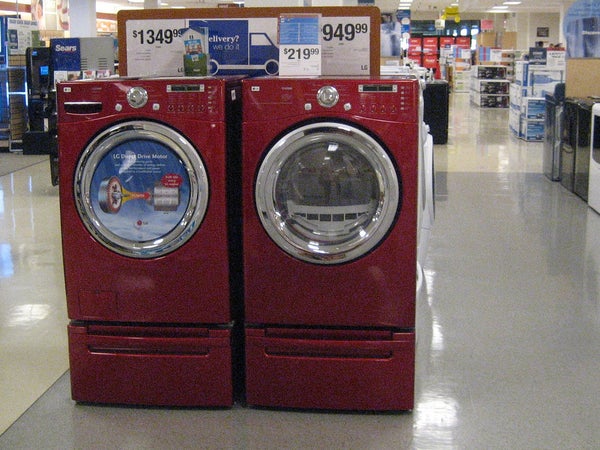This article was published in Scientific American’s former blog network and reflects the views of the author, not necessarily those of Scientific American
You can save more money by replacing your furnace rather than buying a clothes dryer or by upgrading your windows instead of getting a new refrigerator, according to new research published this month in the journal Environmental Science and Technology.
Conducted by a team of scientists from the Stillwell Research Group at the University of Illinois at Urbana-Champaign, this research discusses how appliances that are water efficient can lower your energy costs and vice versa.
For example, your washing machine will use both water and electricity when you clean a load of laundry. Then, the wastewater that is produced will take energy to treat. Conversely, the electricity that is consumed during the process almost certainly took water to produce.
On supporting science journalism
If you're enjoying this article, consider supporting our award-winning journalism by subscribing. By purchasing a subscription you are helping to ensure the future of impactful stories about the discoveries and ideas shaping our world today.
According to the researchers behind this new study - Christopher M. Chini, Kelsey L. Schreiber, Zachary A. Barker, and Ashlynn S. Stillwell – consumers need to take all of these factors into account when they consider what washing machine to buy in the first place.
Below is an edited, partial transcript of an interview with two of this report’s authors – Ashlynn S. Stillwell and Christopher M. Chini – with the Siebel Energy Institute, which supported the study.
Q: This study takes a holistic approach to examining each appliance and fixture; looking at energy and water consumption in tandem. In your opinion, what’s most valuable about analyzing the energy-water nexus?
A: The most valuable reason to evaluate the energy-water nexus is that we get a fuller picture of the water and energy sectors together. As we strive toward a sustainable and resilient future, we can no longer consider only singular components of the system (e.g., drinking water) without considering a broader systems perspective: How much energy does it take to get water to my home, and then how much energy does it take to treat the water when it leaves my home? Without considering the interplay between these two vital resources, we leave out an important piece of the sustainability puzzle.
Q: Graduate students on the team created models that simulated energy and water use by an appliance. What do the models show (or what do they look like?)
A: The models displayed direct (at the consumer level) and indirect (at the utility level) consumption for water and energy. Creating cost abatement curves, we displayed the information in a communicative format where the most cost-efficient upgrade is on the left and the least is on the right. Therefore, the rational consumer would implement upgrades in their home from left to right on the abatement curve.
Q: The study was extended from analyzing national averages to specifically looking at data from Chicago, New York City and Los Angeles. What struck you as the most compelling difference between the abatement curves for these urban areas and the national average?
A: The biggest difference between these cities was the consumption of indirect resources. Electricity and natural gas consumption at drinking water and wastewater utilities played a major role in changing the cost abatement curve for energy. Additionally, the biggest factor in variance of the cost abatement curves for water was unaccounted for water (i.e., leaks). These cities varied on either side of the national average abatement curve.
Q: The research revealed that one of the most cost effective upgrades is a water heater. What type of water heater is most efficient and why?
A: The most cost-effective water heater was the high-efficiency natural gas water heater. This water heater has a high efficiency factor and, interestingly, beat out solar water heaters on a national average. Often, solar water heaters have a less-than-efficient electric back-up heater, which can negate the benefits of the solar water heater in some applications.
Q: How do you see your findings enhancing or complementing existing programs that incentivize consumers to invest in more efficient appliances?
A: The findings of this study provide a visual representation of multiple appliances and fixtures. Some of these efficiency investments, such as a water heater or furnace, are out of sight for the homeowner and, therefore, are not high on a priority list for replacement. Our study highlights opportunities for reducing up-front costs of upgrades and highlights appliances that are often overlooked for homeowners, providing opportunities for utilities and local governments to implement incentive or rebate programs.
For a full transcript of this interview, you can visit the Siebel Energy Institute website (link) You can also read the full paper at the Environmental Science & Technology website (link).
